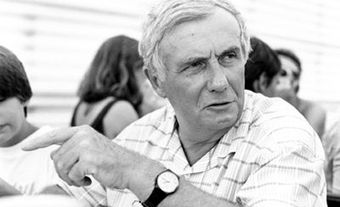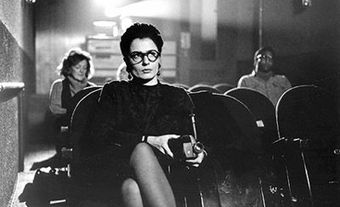Ronald Mann, director, producer, writer, distributor (born 13 June 1958 in Toronto, ON). Ron Mann is one of Canada’s foremost documentary filmmakers and an influential member of the Toronto New Wave. A self-described “cultural historian,” Mann makes idiosyncratic films that typically focus on alternative subjects and marginalized subcultures. His best-known films include the Genie Award-winning Comic Book Confidential (1988), the free jazz documentary Imagine the Sound (1981), the Genie-winning marijuana advocacy film Grass (1999) and Altman (2014), a profile of American film director Robert Altman. Mann also supports independent cinema through his distribution company, Films We Like.
Early Years and Education
Mann was raised in Toronto by his parents, Amy, a painter, and Harold, an electronics store owner. Mann began making films at age 12 and won his first film award in Grade 8. In his high school years, he developed his entrepreneurial skills by screening prints of major Hollywood releases for his classmates at school and in his parents’ basement.
Also key to Mann’s growth as a filmmaker was a trip to the Cannes Film Festival in 1976. His legendary hitchhike from Paris to Cannes (where he spent nights sleeping on the beach) lent a mythological aspect to his persona. It also put him in contact with filmmakers such as Elia Kazan, who advised Mann to forgo film school and simply pursue filmmaking.
Mann continued making movies while receiving a BA in film from the University of Toronto. His student work was marked by an interest in telling stories about alternative subjects from a fresh perspective. Mann received additional mentorship at age 21 when he met filmmaker and noted American Marxist Emile de Antonio. Mann ambitiously cold-called the director when peers told him that a recognizable name would be beneficial in developing his first feature. De Antonio agreed to foster Mann’s skills. His influence is evident in Mann’s countercultural spirit, his interest in portraying alternate histories and his collage aesthetic. Mann often called de Antonio his “second father.”
Films
Mann released his first feature, Imagine the Sound (1981), at age 23. A documentary about the Toronto jazz scene, it established him as an artist who proudly explored the margins. The film was essential for both Mann and the emergence of a group of young, independent filmmakers who would become known as the Toronto New Wave. As Toronto International Film Festival programmer Steve Gravestock wrote, “It is difficult to overestimate the importance and impact of Imagine the Sound within the Toronto film scene. Its release at the tail end of the notorious tax shelter period helped galvanize what many considered a moribund industry.”
Mann’s cult success continued with Poetry in Motion (1982), a celebration of the art and culture of poetry through performances by more than 20 poets, including Michael Ondaatje, Allen Ginsberg and William Burroughs. Poetry Foundation’s Daniel Nester wrote that, “Thirty years on,the film still holds up as an anthology and time capsule.”
Like Imagine the Sound, Poetry in Motion had a significant influence on Canadian cinema. Atom Egoyan, Peter Mettler and Bruce McDonald worked as a production assistants on the film, and the film’s editor, Peter Wintonick, cited it as inspiration for pursuing work as a documentary filmmaker. Similarly, American independent filmmaker Richard Linklater (Boyhood, Dazed and Confused) was inspired to buy his first movie camera after seeing the film and a Q&A session with Mann in Houston in 1982.
Mann’s next film, Listen to the City (1984), an experimental drama featuring performances by poet bpNichol and future NDP leader Jack Layton, had a muted reception. Mann then went to Los Angeles, where he developed three screenplays for Ivan Reitman, all of which were unproduced. He also made a behind-the-scenes documentary for Reitman’s Legal Eagles (1986), but Universal Pictures deemed it too arty for release.
The experience gave Mann a pragmatic appreciation for Hollywood as it bankrolled his own films. His time in Southern California also introduced him to the San Diego Comic Con and a misunderstood subculture that became the subject of one of his greatest successes — Comic Book Confidential (1988). The inventive film about comic book artists won the Genie Award for Best Documentary Feature and screened internationally at festivals such as Sundance and the Chicago International Film Festival, where it was named Best Documentary. As critic Adam Nayman wrote, Comic Book Confidential was a box-office success that “established Mann as Canada's hippest documentary director.”
Mann followed Comic Book Confidential with features such as the dance documentary Twist (1992), which closed the 1992 Toronto Festival of Festivals and inspired a bidding war; the Genie-winning Grass (1999), about America’s marijuana laws; the anti-corporate Woody Harrelson road trip doc Go Further (2003), which opened South by Southwest Film Festival and was nominated for a Genie; Tales of the Rat Fink (2006), about famed hot rod and custom car designer Ed "Big Daddy" Roth; Know Your Mushrooms (2008), which let Mann explore some magic mushrooms; and Altman (2014), about filmmaker Robert Altman (The Player, Gosford Park).
Mann also produced a number of personal documentaries about artists and obsessives: Jim Shedden’s biographical doc Brakhage (1998), about legendary experimental filmmaker Stan Brakhage; Astra Taylor’s Examined Life (2008), about intellectuals such as Cornel West, Slavoj Žižek and Judith Butler taking their philosophies to the streets; Simon Ennis’s idiosyncratic Lunarcy! (2012), about people determined to colonize the moon; and Brian D. Johnson’s Al Purdy Was Here (2015), about famed Canadian poet Al Purdy.
Characteristic Style
Mann is one of the few Canadian independent documentary filmmakers to forge a career outside of the CBC and the NFB. His accessible and meticulously researched films, which he has described as Hollywood-izations of the documentary form, favour stories of outsiders and life beyond the mainstream. They also draw on Emile de Antonio’s method of creating cinematic space through collage. Cameron Bailey once wrote that Mann’s works “are not primarily personal revelations; they operate more as canvasses of alternative landscapes. They're a fan's attempt to re-centre the culture along more radical lines.”
Distribution Company
Mann also supports independent cinema through distribution. He worked on the Criterion Collection’s laser disc releases of Citizen Kane (1941) and King Kong (1933), and pioneered innovative home video releases such as early CD-ROM editions of Poetry in Motion and de Antonio’s Painters Painting (1973).
In 2003, Mann and his business partner, Gary Topp, founded the distribution company Films We Like. The pair went into business when they learned that the acclaimed activist documentary The Weather Underground (2002), which eventually garnered an Oscar nomination, was in need of Canadian distribution. Under Films We Like, Mann has continued his support for marginalized voices by distributing Canadian films, documentaries and international independent films. Many of Mann’s own films are also housed in the catalogue.
Films We Like established itself as a risk-taker with its programming and its efforts to expand the home video market, including the first-ever release of a film on a USB flash drive (Know Your Mushrooms).The company’s notable titles include: Apichatpong Weerasethakul’s Palme d’Or-winning Uncle Boonmee Who Can Recall his Past Lives (2010); Joshua Oppenheimer’s Oscar-nominated The Act of Killing (2012); Pawel Pawlikowski’s Oscar-winning Ida (2014), Christian Petzold’s acclaimed Phoenix (2014); and a collection of films by Emile de Antonio.
Awards
Best Documentary Feature (Comic Book Confidential), Chicago International Film Festival (1988)
Best Documentary Feature (Comic Book Confidential), Genie Awards (1989)
Best Ontario Feature (Twist), Cinéfest Sudbury (1992)
Best Documentary Feature (Grass), Genie Awards (2000)

 Share on Facebook
Share on Facebook Share on X
Share on X Share by Email
Share by Email Share on Google Classroom
Share on Google Classroom


